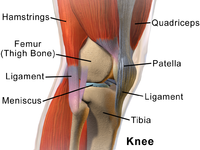
[Supramalleolar osteotomy in asymmetric ankle osteoarthritis : Short-term clinical and radiographic results].
Sign Up to like & getrecommendations! Published in 2017 at "Der Orthopade"
DOI: 10.1007/s00132-017-3416-4
Abstract: BACKGROUND The main indication for the supramalleolar osteotomy is asymmetric ankle osteoarthritis with concomitant supramalleolar valgus or varus deformity. The aim of this prospective study was to analyze short-term clinical and radiographic outcomes in patients… read more here.
Keywords: asymmetric ankle; osteoarthritis; ankle osteoarthritis; supramalleolar osteotomy ... See more keywords

The effect of ankle and hindfoot malalignment on foot mechanics in patients suffering from post-traumatic ankle osteoarthritis.
Sign Up to like & getrecommendations! Published in 2020 at "Clinical biomechanics"
DOI: 10.1016/j.clinbiomech.2020.105239
Abstract: BACKGROUND Ankle and hindfoot malalignment is a common finding in patients suffering from post-traumatic ankle osteoarthritis. However, no studies have addressed the effect of concomitant foot deformities on intrinsic foot kinematics and kinetics. Therefore, the… read more here.
Keywords: post traumatic; ankle; ankle osteoarthritis; foot ... See more keywords

A case of ankle osteoarthritis associated with lateral premalleolar bursitis caused by chronic ankle instability
Sign Up to like & getrecommendations! Published in 2021 at "International Journal of Surgery Case Reports"
DOI: 10.1016/j.ijscr.2021.105671
Abstract: Highlights • Lateral premalleolar bursitis was caused by check valve mechanism of instability.• Bursitis with ankle osteoarthritis was treated with arthroscopic arthrodesis.• It is importance to stop the communication between the bursa and ankle joint. read more here.
Keywords: ankle; bursitis caused; ankle osteoarthritis; bursitis ... See more keywords

Radiographic, physical and self-report measures that characterize ankle osteoarthritis
Sign Up to like & getrecommendations! Published in 2020 at "Osteoarthritis and Cartilage"
DOI: 10.1016/j.joca.2020.02.624
Abstract: Purpose: Ankle sprains and fractures are among the most common injuries sustained in active individuals, and they are associated with increased risk of developing ankle osteoarthritis (OA). Studies have demonstrated that ankle OA has a… read more here.
Keywords: ankle osteoarthritis; ankle; quality life; asymptomatic individuals ... See more keywords

Incidence and progression of ankle osteoarthritis: The johnston county osteoarthritis project.
Sign Up to like & getrecommendations! Published in 2020 at "Seminars in arthritis and rheumatism"
DOI: 10.1016/j.semarthrit.2020.10.015
Abstract: OBJECTIVE To determine the incidence and progression of ankle osteoarthritis (OA) and associated risk factors in a community-based cohort of African Americans and whites. METHODS Data were from 541 participants who had standardized lateral and… read more here.
Keywords: incidence progression; raoa; ankle osteoarthritis; progression ankle ... See more keywords

3D Printing-Assisted Supramalleolar Osteotomy for Ankle Osteoarthritis
Sign Up to like & getrecommendations! Published in 2022 at "ACS Omega"
DOI: 10.1021/acsomega.2c04764
Abstract: Ankle osteoarthritis (OA) is an important factor that causes pain and dysfunction after ankle joint movement. In early and mid-term ankle OA, supramalleolar osteotomy can delay the progression of disease and maximize the preservation of… read more here.
Keywords: 3dp group; ankle osteoarthritis; osteotomy; assisted supramalleolar ... See more keywords

Visualization and quantification of the degenerative pattern of the talus in unilateral varus ankle osteoarthritis
Sign Up to like & getrecommendations! Published in 2019 at "Scientific Reports"
DOI: 10.1038/s41598-019-53746-6
Abstract: The aim of this study was to quantify and visualize the degenerative patterns of the talus in ankle osteoarthritis (OA). The differences in talar morphology between sides of patients with unilateral varus ankle OA (medial… read more here.
Keywords: ankle; varus ankle; ankle osteoarthritis; visualization quantification ... See more keywords

Simultaneous Total Ankle Replacement and Contralateral Ankle Arthrodesis for Bilateral Ankle Osteoarthritis: A Retrospective Study Focused on Clinical Outcomes and Cost‐effectiveness
Sign Up to like & getrecommendations! Published in 2022 at "Orthopaedic Surgery"
DOI: 10.1111/os.13390
Abstract: Total ankle replacement (TAR) and ankle arthrodesis (AA) are two common surgical treatment options for end‐stage ankle osteoarthritis. However, few reports compare the outcomes of simultaneous TAR and contralateral AA for bilateral ankle osteoarthritis. The… read more here.
Keywords: ankle arthrodesis; ankle replacement; ankle osteoarthritis; bilateral ankle ... See more keywords

Health-Related Quality of Life in Ankle Osteoarthritis: A Case-Control Study.
Sign Up to like & getrecommendations! Published in 2021 at "Cartilage"
DOI: 10.1177/19476035211025814
Abstract: OBJECTIVE Ankle osteoarthritis (OA) has a prevalence of 3.4% in the general population of which 70% to 78% is posttraumatic, affecting younger patients with a longer projected life span compared with hip and knee OA.… read more here.
Keywords: physical mental; control; ankle osteoarthritis; patients ankle ... See more keywords

Supramalleolar osteotomy with medial distraction arthroplasty for ankle osteoarthritis with talar tilt
Sign Up to like & getrecommendations! Published in 2019 at "Journal of Orthopaedic Surgery and Research"
DOI: 10.1186/s13018-019-1168-z
Abstract: BackgroundAn increased preoperative talar tilt (TT) angle was reported to be positively correlated with treatment failure after supramalleolar osteotomy (SMOT) for varus ankle osteoarthritis. Distraction arthroplasty was reported to have the ability to correct increased… read more here.
Keywords: smot; ankle osteoarthritis; group; talar tilt ... See more keywords

Ankle osteoarthritis: comprehensive review and treatment algorithm proposal
Sign Up to like & getrecommendations! Published in 2022 at "EFORT Open Reviews"
DOI: 10.1530/eor-21-0117
Abstract: Ankle osteoarthritis (OA) is much less frequent than knee or hip OA, but it can be equally disabling, greatly affecting the quality of life of the patients. Approximately 80% of ankle OA is post-traumatic, mainly… read more here.
Keywords: comprehensive review; treatment; treatment algorithm; ankle osteoarthritis ... See more keywords